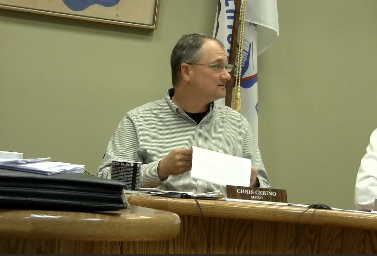Mayor Chris Cerino has made a public apology for a second Open Meetings violation of the Chestertown Waterfront Task Force that occurred under the previous mayor and council.
“I’m really hoping that this ends the public meetings violations from the previous task force group,” Cerino said at Tuesday’s council meeting.
The Maryland Open Meetings Compliance Board has ruled for a second time that the now defunct Chestertown Waterfront Task Force, a public body established by the town last year, violated the Open Meetings Act when it met in private with a majority of the Town Council members on March 22, 2013 – and without providing adequate public notice.
“The minutes of the March 22 meeting show active participation by a quorum of the Council members in a discussion about the uses that might be made of waterfront property in the Town,” the compliance board wrote in their March 4, 2014 opinion. “This discussion was Town business, and we therefore find that the Council “met” at the Task Force meeting.”
In the video below Cerino apologizes for the second Open Meetings violation.
In addition to holding a quorum out of public view, the compliance board ruled that the town council failed to provide adequate public notice of the meeting. At the March 18, 2013 council meeting, members of the council were invited to attend the task force meeting four days later — but members of the public were excluded based on the rules established by the council when it formed the task force just two months earlier.
“As the Council did so without giving notice of a Council meeting, we conclude that the Council violated the notice provisions of the Act,” the compliance board wrote. “The announcement at the March 18, 2013 Council meeting that Council members were invited to attend did not serve as notice to the public that others could attend.”
The Task Force was comprised of four appointees from the town and four from Washington College to plan a vision of a public-private partnership on the Chester River waterfront, where WC and the town are the two largest property owners.
This is the second finding by the compliance board in response to complaints filed by the Kent County News.
On Jan. 13 the compliance board ruled that the task force itself was illegal under the Open Meetings Act because it was formed by a resolution of the town to conduct town business in private — and did so throughout 2013.
“The task force was a public body, because it was created by the Town Council’s resolution…” the compliance board wrote in its Jan. 13, 2014 opinion. “It performed an “advisory function” subject to the Act, because the Town, by formal action, delegated to it the responsibility to “study . . . a matter of public concern or [make] recommendations on the matter.”
Part of the second complaint focused on redactions in the task force’s meeting minutes of the March 22, 2013 meeting, which the compliance board said were not a violation of the Open Meetings Act.
The redactions were made to protect the identities of private citizens who spoke before the task force and were unaware they were speaking to a public body subject to the Open Meetings Act. The task force itself also believed throughout 2013 that it was not subject to the Open Meetings Act.
Under the Open Meetings Act public bodies can close meetings to “consider the acquisition of real property for a public purpose” but must disclose the details at the next public meeting.
But the compliance board said applying the rule here was difficult because the task force itself operated all along on the “mistaken belief that it was not subject to the Act.”
The compliance board’s initial finding on Jan. 13 that the task force was formed and operated illegally brought criticism on the town for not informing the task force of it’s obligations under the Act.
“In the past, we have encouraged public bodies that create citizen task forces to make the members aware that their public service includes the duty of openness and then to provide them with the staff necessary to perform the tasks of giving public notice, keeping minutes, and making those records available for public inspection,” said the Jan. 13 opinion. “We glean that the Town Attorney was not consulted about the status of the task force, that the task force’s members were not apprised of its status as a public body subject to the Act.”



Bill Arrowood says
Editor,
Is a public apology the only penalty for this situation? It has been said that there were consequences, potentially expensive ones, but I haven’t read anything about what the actual repercussions of this are.